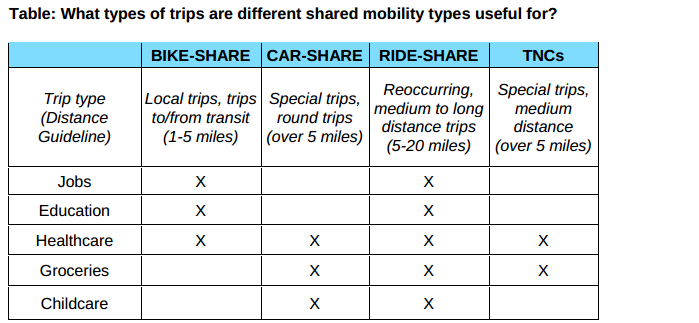INSTITUTE FOR TRANSPORTATION & DEVELOPMENT POLICY
LIVING CITIES
Introduction
In the last decade, shared mobility services have taken off across the United States as a complement to local public transit and an alternate to private car ownership.
These services, which include car-share, bike-share and ride-share, maximize the use of vehicles by sharing them among multiple users, encourage more transport options, and aim to reduce transportation costs for users. While mass rapid transit moves the most people most efficiently and is the backbone for urban development, this paper is concerned mostly with recent advances in low-volume passenger carrier models in the United States. The purpose of this report is to highlight the potential for shared mobility systems such as bike-share and car-share to benefit low-income individuals.
As these models have developed, advocates, policymakers and shared mobility operators have explored how the emerging field can more directly benefit low-income individuals, who often face longer and more costly commute times, through pilot programs, research, and other strategies. However, current usage of shared mobility systems among low-income communities remains lower than usage by the general population.
Current usage of shared mobility systems among low-income communities remains lower than usage by the general population.
This report is a survey of existing shared mobility strategies and their attempt to expand services to low-income individuals. It is our hope that the findings can inform operators, government agencies, funders, non-profit organizations and others as they try to tap into the potential of shared mobility strategies to improve the lives of low-income individuals.
The Rise of Shared Mobility
Shared mobility has helped expand transportation options for several decades in the United States, but only recently gained attention as a result of operational and service maturity. Today, shared mobility systems play a growing role in helping Americans navigate cities and regions to access housing, jobs, education opportunities, and other critical services. This momentum can be explained, in part, by a cultural shift in the United States in which access to assets is valued over ownership. Owning a car is no longer a critical need among many city dwellers that prefer paying for and using vehicles only when needed (Earley, 2014).
Shared mobility is also emerging as a complement to the historically under-resourced U.S. public transit system. Investment in high-quality mass transit in America lags far behind many other developed countries. France, for example, has 18.8 miles of mass rapid transit per million urban residents, while the U.S. has just 5.5 miles (Hook, 2014). Co-location of shared mobility with conventional transit service holds great promise for expansion of both systems. While investing in mass rapid transit is central to long-term sustainability, shared mobility can help fill in the gaps as well as extend the reach of existing public transit networks.
Download full version (PDF): Connecting Low-Income People to Opportunity with Shared Mobility
About the Institute for Transportation & Development Policy
www.itdp.org
Founded in 1985, the Institute for Transportation and Development Policy (ITDP) has become a leading organization in the promotion of environmentally sustainable and equitable transportation policies and projects worldwide. ITDP was created by sustainable transport advocates in the U.S. to counteract the export to developing countries of costly and environmentally damaging models of dependence on the private automobile. In its first ten years, ITDP successfully advocated for the redirection of lending activity by the World Bank and other multi-lateral institutions away from an exclusive focus on road projects and toward more multi-modal transport solutions.
About Living Cities
www.livingcities.org
Founded in 1991, Living Cities harnesses the collective power of twenty two of the world’s largest foundations and financial institutions to build a new type of urban practice. Together, we are working with cross-sector leaders in cities to develop and scale new approaches to dramatically improve the economic well-being of low-income people. Our investments, research, networks and convenings catalyze fresh thinking and combine support for innovative, comprehensive, local approaches with real-time sharing of knowledge to accelerate and deepen adoption in more places.
Tags: Bike Share, Car Share, INSTITUTE FOR TRANSPORTATION & DEVELOPMENT POLICY, ITDP, Living Cities







 RSS Feed
RSS Feed